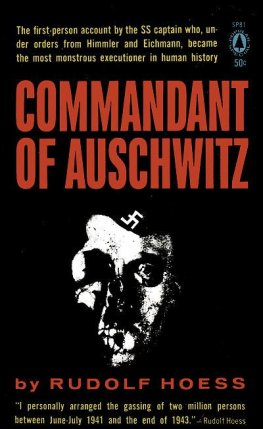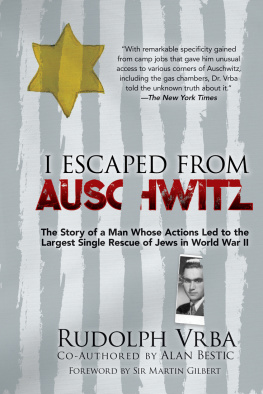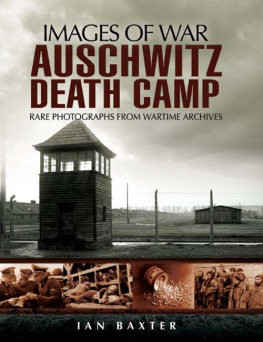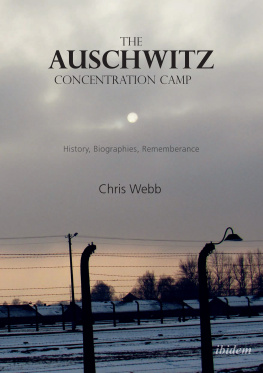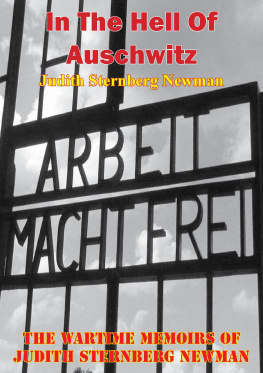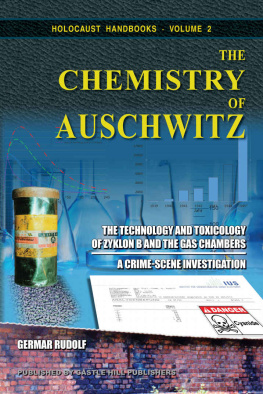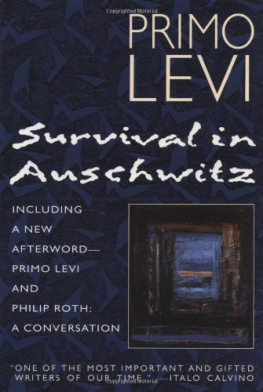This edition is published by PICKLE PARTNERS PUBLISHINGwww.pp-publishing.com
To join our mailing list for new titles or for issues with our books picklepublishing@gmail.com
Or on Facebook
Text originally published in 1953 under the same title.
Pickle Partners Publishing 2015, all rights reserved. No part of this publication may be reproduced, stored in a retrieval system or transmitted by any means, electrical, mechanical or otherwise without the written permission of the copyright holder.
Publishers Note
Although in most cases we have retained the Authors original spelling and grammar to authentically reproduce the work of the Author and the original intent of such material, some additional notes and clarifications have been added for the modern readers benefit.
We have also made every effort to include all maps and illustrations of the original edition the limitations of formatting do not allow of including larger maps, we will upload as many of these maps as possible.
AUSCHWITZ IN RETROSPECT: THE SELF-PORTRAIT OF RUDOLF HOESS, COMMANDER OF AUSCHWITZ
BY
JOSEPH TENENBAUM
AUSCHWITZ IN RETROSPECT:
THE SELF-PORTRAIT OF RUDOLF HOESS, COMMANDER OF AUSCHWITZ
BY JOSEPH TENENBAUM
Rudolf Hoess has killed more people than any man in history, and Auschwitz (Owicim) was the greatest charnel house of all times. There has been no dearth of publications about the place or the person. The multitude of witnesses that have clogged the road to Nuremberg to attest or confess at the International Trial of War Criminals has been prodigious and the output of printed matter well-nigh staggering. As time goes on, the Nazi criminals themselves have been emboldened to make certain admissions and take credit for some of the very things for which they have been condemned. It seems that after a period of repudiation of the crimes and apologia for them, we are entering an era of memoirs by boastful generals and complacent Nazi small fry, eager to bask in the sun of regained self-confidence and unregenerate Nazi mentality.
The Hoess memoirs are an exception to both trends. His revelations are neither apologetic nor an attempt at vindication. The memoirs are indeed a unique literary document, in which the author is trying to explain, first and foremost himself to himself, Hoess to Hoess, and incidentally also to shed light on the most hidden mainsprings of a mind gone criminal. Hoess was no literary craftsman. He put down in writing all he had to say in unembellished, colorless prose. He wrote his confessions and self-analysis in 1946, in a prison cell in Cracow, in the shadow of a trial before a Polish Tribunal, without any illusions concerning its outcome. It is, therefore, literally, a confessional before death.
Most of these writings on the subject of the Catastrophe have been concerned with the victims. In contrast, few investigators have tried to penetrate into the psychological web of the executioners, the SS guards. Fewer yet have succeeded in unravelling the mental processes and reactions of men turned mass murderers. It is for this reason that the Hoess revelations assume added significance.
It is customary in modern biography to peer into the cradle to see the man. One looks into the family background and probes into the nursery for the various complexes which mold the fate and character of the future heroes or scoundrels. And even our literary simpleton, Rudolf Hoess, followed this fashion, as seen in the pretentious subtitle of the first chapter of his autobiography, namely, The Background My Soul, Its Mold, Life and Experience. {1}
Family Background
Rudolf Franz Ferdinand Hoess was born on November 25, 1900, in Baden-Baden, a picturesque town in the Rhineland. His family combined German military tradition, on his fathers side, with commercial wealth on his mothers. {2} His home was strictly German middle-class. His father was a morose, bigoted Catholic who dreamed of making his son a God-fearing priest. His mother, Pauline Speck, was a kind-hearted, congenial, yielding German Hausfrau .
Under the influence of his father, Rudolf grew up full of piety and devotion to Church and authority. What father told me was sacred with me and so were the priest and teacher. {3} Although his father was a strict disciplinarian, Rudolf was treated with consideration at home; he was never beaten or even severely scolded. The standard punishment was fathers insistence that he pray for Gods forgiveness. It does not seem, however, that he was too severely restricted, despite his animosity against his father that appears in his biography, for he would wander away from home to his beloved animals whenever he liked. He was very fond of horses and spent much of his time in a neighboring peasants stable. {4} He felt also a great attraction to brooks and rivers and could never bathe or wash himself enough (p. 62). Freudians will see here a clue to a severe guilt complex.
When he was six years old, Rudolfs family moved to Mannheim, where there were neither stables nor horses in the neighborhood. The wound was soon healed by the gift of Hans, a black pony. The pony became his fondest companion. He even brought it into the room, during his parents absence. Evidently, his parents gave him much freedom of movement. His father, who had vowed that Rudolfs life would be dedicated to the work of God, spent much time with him talking about the miracles, and took him to the shrines of Germany, Switzerland and even to Lourdes.
Rudolf was a sensitive, self-righteous child. He hated bullies and despised evil-doers. He shunned liars. He could not tolerate any injustice against himself or anybody else, and felt a raging desire to seek revenge. He was easily disillusioned, and an explosive touchiness made him a poor playmate and further intensified his inclination towards solitude and introversion. His delicate trait of sensitiveness manifested itself in yet another direction. The future SS torturer could not see anybody enduring pain, bodily discomfort or humiliation. He winced inwardly at the twinge of an anguished expression. This went with his confessed benumbed feeling of filial sentiment. Even the untimely death of his father in Rudolfs fourteenth year failed to ruffle his cold equilibrium. Yet, while it is true that his whole demeanor betrayed not only a heavy layer of static discipline, but also a low point of emotional exuberance, including depressed sexual ardor, one cannot deny him the faculty of love. This was proved by his tender attachment to his wife and three children later on in life.
No one who has so far followed Rudolfs childhood could, in all honesty, venture the conclusion that this was a patch where thistles grow. The authoritarian, guilt-ridden father who sought escape in religious bigotry, had undoubtedly exerted a direct influence on the formation of this sensitive childs character. But this was not an American but a typically German patriarchal home, and Rudolf was a typical German youth, with a somewhat schizoid introverted strain. It was also his misfortune that the normally turbulent years of his early adolescence fell in a period of uncommon turbulence on a world-wide scale.
His First Taste of Blood
In 1914, when the First World War broke out in all its fury, Rudolf, like every German youth of his age, wanted to enlist. After several futile attempts, he succeeded in his sixteenth year in breaking through the age barrier, following completion of the fifth class in the gymnasium. He joined the regiment in which his father and grandfather had served, the latter as colonel. Following training, he was assigned to a cavalry detachment, en route to the Middle East. He saw battle in Iraqwhere he killed his first Hindu soldier and almost collapsed with terror. In 1917, wounded in battle on the Jerusalem front, he was sent for treatment to the German-Palestinian Kaiser Wilhelm Hospital.




